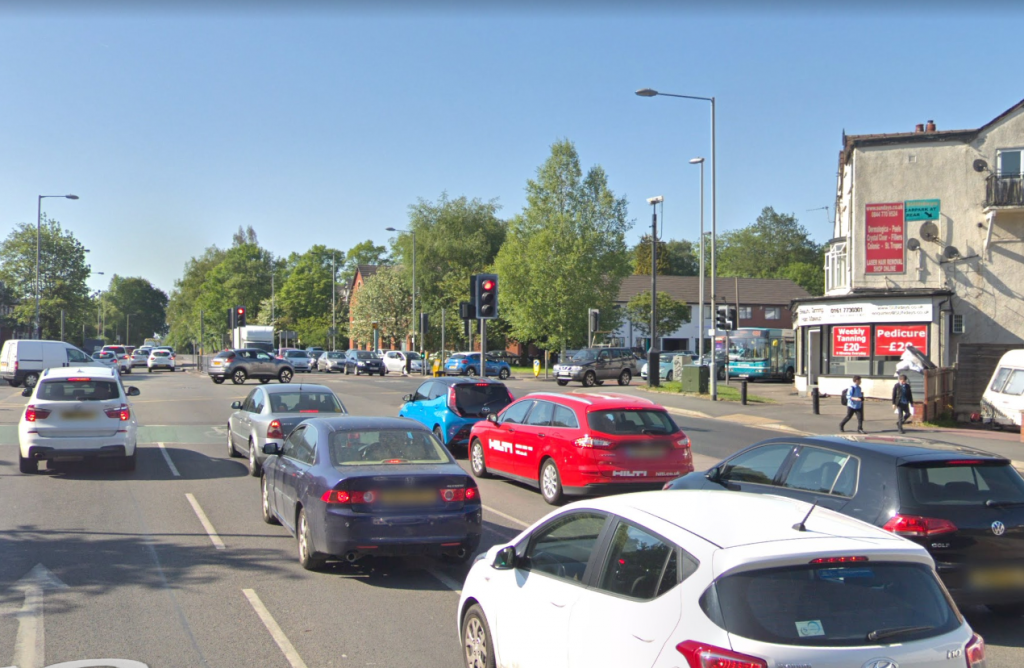
GREEN campaigners have warned that the next generation of Salfordians could be “irreparably damaged” by air pollution after a busy city road was named as one of the most congested in the country.
Bury New Road connects the M60 to Manchester city centre via Higher Broughton and data company Inrix has named it as one of the UK’s worst stretches of traffic.
On average, each driver loses 34 hours a year sat on Bury New Road and idling cars – when a vehicle sits in a traffic jam with the engine on but not moving – are thought to be responsible for some of the 40,000 air pollution deaths a year across the country.
Exhaust emissions can lead to acute respiratory problems, temporary decreases in lung capacity and the inflammation of lung tissue in elderly residents.
But Manchester Friends of the Earth also insist that idling cars can affect youngsters too and that the government needs to solve congestion problems in order to protect the region’s health.
Spokesman Pete Abel said: “We know that air pollution is a serious issue with those who are already towards the end of their lives but it can also cause irreparable damage to youngsters.
“Physical and mental development can both be affected by breathing in poor air and we are facing a national health emergency and our politicians have consistently failed us on this.
“Bury New Road and other roads across the region are so congested because our roads and public spaces do not encourage people to walk or cycle when all our European neighbours have proven that this is an effective way to solve traffic congestion.
“Companies should be encouraged to subsidise workers’ transport costs and buses should be far, far cheaper – if not free – for the country’s under 30s.
“We have to start addressing these issues. Building more roads to alleviate traffic will solve nothing because new roads just fill up. We have to get more people on to cheaper, better and more reliable ways of moving around to their homes and workplaces.”
Dr Penny Woods, Chief Executive of the British Lung Foundation, called for more action from the government.
“We know that UK’s air pollution limit for fine particulate pollution (PM2.5) – the most harmful pollutants – doesn’t go far enough to protect people’s health,” she said. “That’s why we’re calling for the World Health Organisation’s limit on PM2.5 to be included in the upcoming Environment Bill – while the government acknowledged this guideline in their recent clean air strategy, it must now be turned into law to ensure we meet it.
She added: “Importantly, we can’t lose focus on transport as a main culprit for air pollution. We need to see Clean Air Zones in Britain’s most polluted towns and cities, a diesel scrappage scheme and investment into cleaner travel alternatives such as walking, cycling and public transport.”
Salford council responded to the Irnix survey and mirrored Friends of the Earth as they accept that public transport is the key to solving the issue.
And transport bosses were especially keen to point to the Vantage bus scheme run on the A6 as proof that Salford can successfully cope with its traffic problems.
Councillor Roger Jones, executive support for transport, said: “Nationally the volume of traffic on our roads has been steadily increasing every year; Salford is not alone in facing the challenges that brings.
“The only sustainable long-term solution is to see fewer cars on the road with more people walking or cycling and using a reliable and efficient public transport system where possible.
“The Vantage bus, which runs along the A6, is a great example of how people will switch if public transport is made faster and more reliable.
“It opened in April 2016 and passenger numbers have risen from 28,000 a week then to 65,000 a week now – and are expected to continue to rise.”














Recent Comments